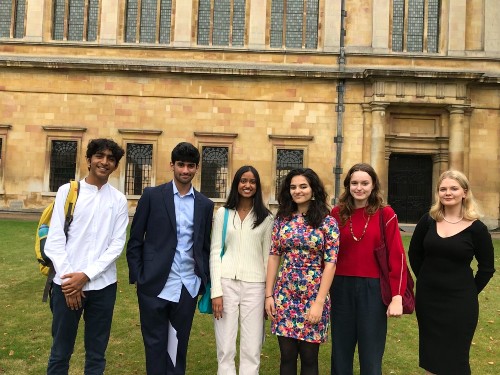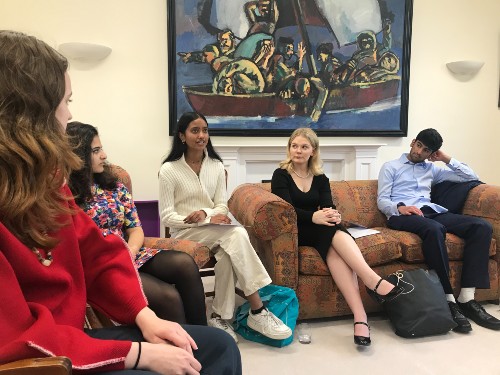
Submitted by Livia Harriman on Fri, 08/10/2021 - 13:58
Nine participants in this year’s RA Butler prize for essays in Politics and International Relations – including the three winners and six of the candidates who received special commendations – attended a prize ceremony hosted at Trinity College Cambridge on 25th September 2021.
The six who attended in person were welcomed by Dr Glen Rangwala, who teaches the politics of the Middle East, and two of the prize winners from 2019 – Evie Morgan and Matthew Gursky, who are both now students at the University of Cambridge.
They were joined online by three participants, as well as by Dr Christopher Brooke, who lectures in political theory.
After a lunch for those who were able to attend in person, the nine competition participants joined in a discussion on the theme of how the pandemic is changing politics around the world today.
They each drew upon themes from their essays and their wider preparation.
Saumya Nair (Cheltenham Ladies’ College, Gloucestershire), who won the prize for the best essay and who wrote her essay on whether accountability could be preserved during times of crisis, argued that government transparency was a key issue during periods of crisis. Even if standard conditions of accountability cannot (and may even should not be) held to, issues of transparency had been brought to the fore during the pandemic, but that there was no guarantee that this would continue after the crisis is over.
Anjali Raman-Middleton (Harris Westminster Sixth Form, London) focused on how extraordinary governmental powers often became normalised even after the period of exceptionality was over, but that this pandemic had shown that public confidence reduced over time, leading to greater questioning of government powers.
Purav Menon (Westminster School, London) drew attention to the role of the mass media in shaping public debate, on how the pandemic provides the opportunity for mass media to become more sensationalist. Noemi Elliott (Phillips Academy, Andover MA, United States) by contrast drew attention to how many populist movements had struggled to provide plausible accounts to most people of how public policy should respond to the pandemic, and lost trust as a result.
Scarlett Clarke (St Mark's Catholic School, London) reflected on the disproportionate socioeconomic effects of the pandemic on those who work in the service sector, who are more likely to be women and from ethnic minorities. Georgia Stewart (Cardinal Newman College, Preston) questioned whether the pandemic made us rethink notions of progress, and particularly on how it had foregrounded issues through social media that had previously been lower political priorities.
The discussion turned from there to international repercussions. Liyana Eliza Glenn (home-schooled, UK), who was one of the joint second prize winners, focused on international leadership during periods of crisis – that is, on how shifts of power and legitimacy could occur during crisis, and that was noticeable in the pandemic, with the US being slow in adopting a significant international role especially in relation to the distribution of vaccines. This forces us to rethink what we mean when we discuss how ‘globalisation’ was to be understood in today’s world. Justin Chan (Harrow School, London) pointed to how the pandemic showed the limited agency of governments in addressing public health problems, but that the potential for international cooperation and innovation was still there – in particular, the renewed politicisation of many populations showed a high level of engagement with contemporary political issues.
Thanks very much to all those who participated in a thoroughly enjoyable and intellectually stimulating day.
Find out more about the RA Butler prize here>>


